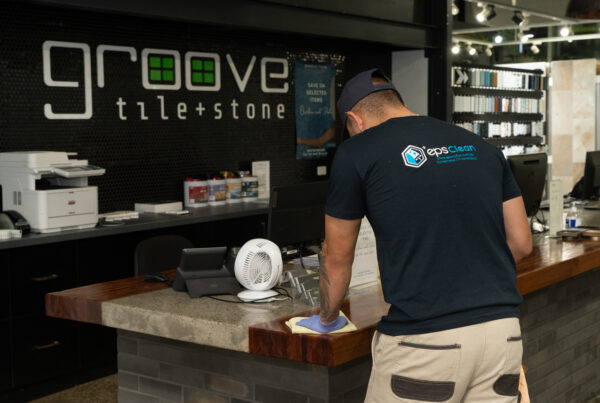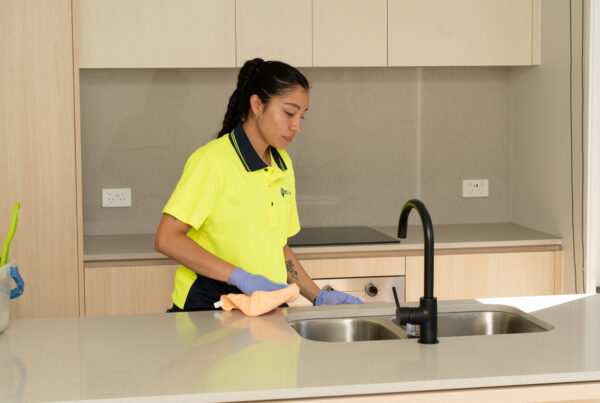Here’s a story that might sound familiar: A builder we know spent three weeks scrambling to get a commercial project ready for handover. The construction was complete, the client was scheduled for final walkthrough, and everything should have been smooth sailing. Instead, the team found themselves dealing with months of accumulated dust, debris, and construction residue that had settled into every corner, crack, and crevice.
What should have been a straightforward cleaning job became a nightmare of scraping, scrubbing, and rework. The handover was delayed by two weeks, costing thousands in penalties and nearly losing the client altogether. The worst part? It was completely preventable.
Smart builders have learned that cleaning during construction, not after, is the difference between smooth handovers and costly disasters. Let’s explore why this approach works and how you can implement it on your projects.
The Traditional Approach: Why It Fails
Most builders treat cleaning like an afterthought – something that happens after construction is complete, right before handover. This approach seems logical on the surface, but it creates several serious problems:
The Accumulation Problem
Construction dust and debris don’t just sit there politely waiting to be cleaned. They:
- Settle into hard-to-reach places where they become increasingly difficult to remove
- Mix with moisture to create stubborn, cake-like residues
- Integrate with finishes in ways that can cause permanent damage
- Compound over time making cleaning exponentially more difficult
Think of it like trying to clean a dirty pan – the longer you wait, the harder it becomes to get clean.
The Time Crunch Crisis
When cleaning is left until the end, it becomes a race against the handover deadline. This creates:
- Rushed work that misses important details
- Quality compromises due to time pressure
- Stress and chaos that affects the entire team
- Higher costs from overtime and emergency cleaning services
The Limited Access Challenge
By the time construction is complete, access becomes complicated:
- Finished surfaces that must be protected during cleaning
- Installed fixtures that complicate cleaning procedures
- Restricted access to areas that were easily cleanable during construction
- Increased damage risk from cleaning around delicate finishes
The Smart Builder’s Approach: Progressive Cleaning
Progressive cleaning means integrating cleaning activities throughout the construction process, not just at the end. This approach offers significant advantages:
Phase-Based Cleaning
Different construction phases require different cleaning approaches:
Foundation and Framing Phase:
- Remove excess concrete and debris
- Clean work areas for next phase
- Prevent accumulation of materials that become harder to remove later
Rough-In Phase:
- Clean around electrical and plumbing installations
- Remove dust and debris from mechanical systems
- Prepare surfaces for insulation and drywall
Drywall and Finishing Phase:
- Manage drywall dust before it spreads throughout the building
- Clean around newly installed fixtures
- Address paint and finish overspray immediately
Final Phase:
- Detail cleaning of all surfaces
- Address any accumulated issues
- Final preparation for handover
The Compound Benefits
When cleaning happens during construction, each phase builds on the previous one:
- Easier cleaning because debris hasn’t had time to settle and harden
- Better access to areas that become difficult to reach later
- Reduced damage risk to finished surfaces
- Improved working conditions for subsequent trades
Real-World Benefits
Let’s talk about what progressive cleaning actually delivers in practical terms:
Improved Working Conditions
Clean work sites are:
- Safer with fewer trip hazards and better visibility
- More efficient with less time spent managing debris
- More professional creating better relationships with clients and inspectors
- Healthier with reduced dust and debris exposure
Better Quality Control
When sites are cleaned regularly:
- Issues are identified earlier when they’re easier to fix
- Work quality improves in cleaner, more organized environments
- Client visits create better impressions throughout the project
- Inspections go smoother with clearly visible work areas
Cost Savings
Progressive cleaning saves money through:
- Reduced final cleaning costs because less intensive work is needed
- Fewer delays from cleaning-related handover issues
- Lower damage risk to finished surfaces
- Improved efficiency from better working conditions
Implementation Strategy
Implementing progressive cleaning requires planning and coordination, but the process is straightforward:
Project Planning Integration
From the start of your project:
- Budget for cleaning at each major phase
- Schedule cleaning services before they’re needed
- Coordinate with trades to minimize disruption
- Communicate expectations to all team members
Partnership with Cleaning Professionals
Professional cleaning services that specialize in builders cleaning services in Brisbane understand the unique requirements of construction sites. They can:
- Adapt to your schedule and work around active construction
- Use appropriate techniques for different construction phases
- Provide specialized equipment for construction-specific challenges
- Guarantee results that meet handover standards
Timeline Coordination
Effective progressive cleaning requires coordination:
Weekly Cleaning:
- Remove debris and maintain general cleanliness
- Address any immediate issues
- Prepare for next phase of construction
Phase Completion Cleaning:
- Thorough cleaning at the end of each major phase
- Address phase-specific challenges
- Prepare site for next trades
Pre-Handover Cleaning:
- Final detail cleaning and preparation
- Address any remaining issues
- Ensure handover readiness
Addressing Common Concerns
Many builders have concerns about progressive cleaning that prevent them from implementing it:
“It’s Too Expensive”
The reality is that progressive cleaning usually costs less than traditional end-of-project cleaning because:
- Less intensive work is needed when cleaning happens regularly
- Fewer delays mean lower overall project costs
- Better working conditions improve overall efficiency
- Reduced damage risk prevents costly repairs
“It’s Too Complicated”
Progressive cleaning actually simplifies project management by:
- Reducing end-of-project chaos through better organization
- Creating predictable timelines for each phase
- Improving communication between trades and cleaning teams
- Standardizing procedures across projects
“It Interferes with Construction”
Professional cleaning services understand construction environments and can:
- Work around active construction without interfering
- Coordinate with other trades to minimize disruption
- Use flexible scheduling to accommodate project needs
- Provide specialized services for construction-specific challenges
The EPS Clean Advantage
At EPS Clean, we’ve developed specialized approaches for progressive cleaning that integrate seamlessly with construction schedules. Our commercial services are designed to work with builders, not against them.
We understand that construction sites are dynamic environments where schedules change, priorities shift, and flexibility is essential. Our team adapts to your needs while maintaining the high standards necessary for successful handovers.
Technology and Innovation
Modern cleaning technology makes progressive cleaning more effective than ever:
Advanced Dust Control
Professional cleaning services use:
- HEPA filtration systems that capture fine particles
- Negative air pressure to prevent dust migration
- Specialized containment for dust-generating activities
- Real-time monitoring of air quality and cleanliness
Efficient Cleaning Systems
Modern equipment enables:
- Faster cleaning with less disruption to construction
- Better results through specialized tools and techniques
- Reduced water usage through advanced cleaning methods
- Improved safety through better equipment design
Success Stories
Builders who implement progressive cleaning report:
- Reduced handover delays by an average of 3-5 days
- Improved client satisfaction scores
- Lower overall cleaning costs despite more frequent service
- Better working relationships with trades and clients
- Increased profitability through improved efficiency
Making the Transition
If you’re ready to implement progressive cleaning on your projects:
Start Small
Begin with one project to test the approach:
- Choose a manageable project for your first implementation
- Work with experienced cleaning professionals who understand construction
- Document results to build case for broader implementation
- Learn from experience and refine your approach
Scale Gradually
Once you’ve proven the concept:
- Expand to additional projects using lessons learned
- Develop standard procedures that can be replicated across projects
- Train your team on progressive cleaning principles
- Build relationships with reliable cleaning partners
Measure Results
Track the impact of progressive cleaning:
- Handover timeline improvements
- Cost savings compared to traditional cleaning approaches
- Client satisfaction metrics
- Worker productivity in cleaner environments
The Competitive Advantage
In today’s competitive construction market, anything that gives you an edge matters. Progressive cleaning provides several competitive advantages:
Reputation Building
Projects that run smoothly and hand over on time build your reputation as a reliable, professional builder. This reputation leads to:
- More referrals from satisfied clients
- Higher-value projects from clients who value quality
- Better relationships with architects and project managers
- Increased market share in competitive bidding situations
Operational Efficiency
Progressive cleaning improves your overall operational efficiency by:
- Reducing project timelines through better organization
- Improving cash flow through faster project completion
- Reducing stress on your team through better planning
- Creating predictable outcomes that support business planning
Risk Mitigation
Construction is inherently risky, but progressive cleaning reduces several types of risk:
- Schedule risk from cleaning-related delays
- Quality risk from rushed final cleaning
- Safety risk from cluttered, debris-filled work sites
- Financial risk from handover delays and penalties
Industry Trends
The construction industry is moving toward more integrated, systematic approaches to project management. Progressive cleaning is part of this trend:
Lean Construction Principles
Progressive cleaning aligns with lean construction principles by:
- Eliminating waste through better organization
- Improving flow between construction phases
- Reducing variability in project outcomes
- Focusing on value for clients and stakeholders
Sustainability Focus
Environmental considerations are increasingly important in construction. Progressive cleaning supports sustainability by:
- Reducing waste through better debris management
- Improving air quality on construction sites
- Supporting green building certification requirements
- Minimizing environmental impact of construction activities
The Future of Construction Cleaning
As the construction industry continues to evolve, cleaning will become more integrated into overall project management:
Technology Integration
Emerging technologies will make progressive cleaning even more effective:
- IoT sensors for real-time dust and debris monitoring
- Robotic cleaning for routine maintenance tasks
- Digital documentation for quality control and compliance
- Predictive scheduling based on construction phase requirements
Specialization Trends
The cleaning industry is becoming more specialized, with services tailored specifically for construction environments. This specialization benefits builders through:
- Better understanding of construction-specific challenges
- Specialized equipment designed for construction sites
- Trained personnel who understand construction processes
- Integrated services that work seamlessly with construction schedules
Getting Started Today
If you’re ready to implement progressive cleaning on your projects, here’s how to get started:
Assessment Phase
Evaluate your current approach:
- Review recent projects for cleaning-related delays and issues
- Calculate costs of traditional end-of-project cleaning
- Identify opportunities for improvement
- Assess team readiness for new approaches
Planning Phase
Develop your progressive cleaning strategy:
- Create phase-specific cleaning requirements
- Establish budgets for cleaning at each phase
- Identify cleaning partners who understand construction
- Develop communication protocols for coordination
Implementation Phase
Start with a pilot project:
- Choose appropriate project for testing
- Establish clear expectations with all stakeholders
- Monitor results and document lessons learned
- Refine approach based on experience
The Bottom Line
Progressive cleaning isn’t just about having a cleaner construction site – it’s about building a more efficient, profitable, and professional construction operation. Smart builders understand that cleaning during construction, not after, is the key to consistent, successful handovers.
The construction industry is competitive, and margins are tight. Any approach that reduces delays, improves quality, and enhances client satisfaction provides a significant competitive advantage. Progressive cleaning delivers all of these benefits while actually reducing overall project costs.
At EPS Clean, we’ve seen the difference progressive cleaning makes for builders who implement it. Our residential cleaning services in Brisbane and commercial cleaning expertise help builders achieve the kind of handover experiences that build reputations and grow businesses.
The question isn’t whether progressive cleaning works – it’s whether you’re ready to implement it on your projects. The builders who make this transition first will have a significant advantage over those who continue with traditional, reactive cleaning approaches.
Ready to join the ranks of smart builders who schedule cleaning during construction? The time to start is now, and the benefits begin immediately. Your next handover could be the smoothest one yet.



